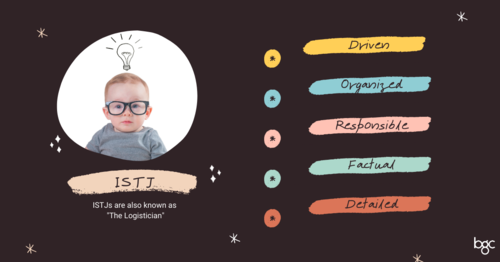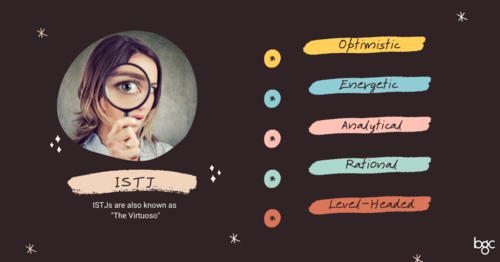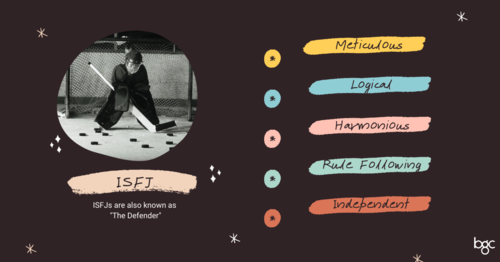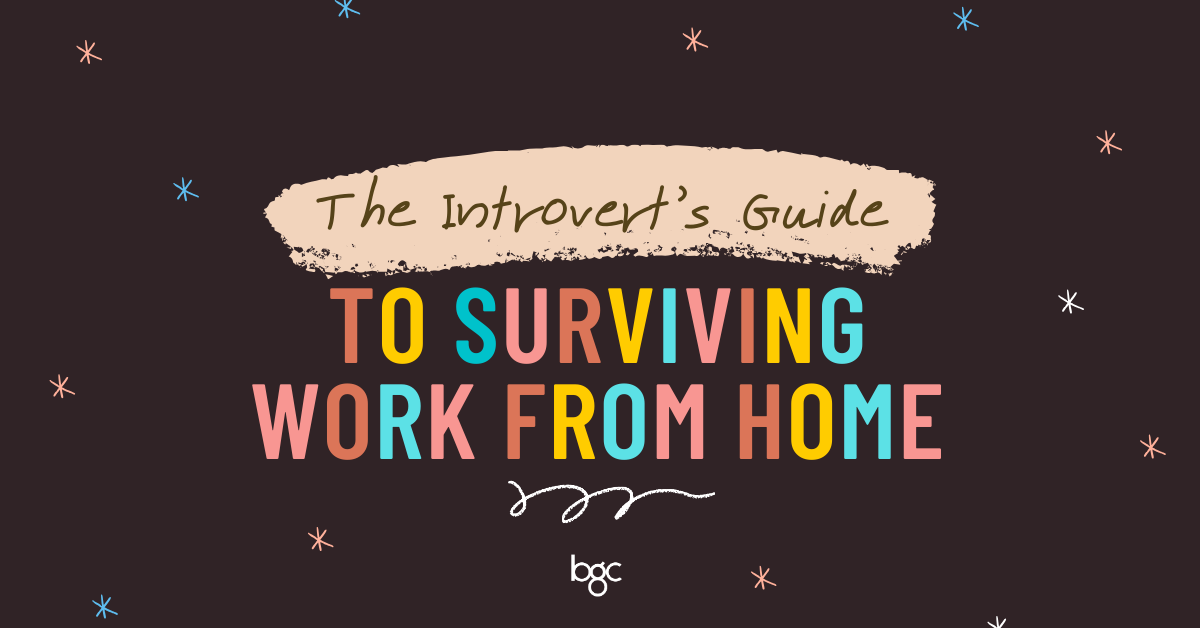The current circuit breaker has been rough to a number of employees working from home. Especially for our more extroverted colleagues. But despite contrary belief, introverts might also find it difficult to adapt to the current work from home and social distancing measures. In fact, some of our introverted colleagues might also find it difficult during the current work-from-home season.
As a recruitment agency in Singapore, we deal with a wide range of employees. From the hyper extroverts to the quiet introverted types. Here’s how you can identify whether the current work from home routine is making you stressed out and how you can deal with it, as an introvert.
1. ISTJ “Logistician”

ISTJs are unwavering individuals with a keen sense of what is right and what is wrong. Especially when it comes to their responsibilities and duties. An individual with this personality type thrives on structure and organization.
However, when working from home, the ISTJ might find usual work processes to lack structure and organization. This, coupled with the potential conflict amongst colleagues might raise the “Logistician’s” stress levels.
Under extreme stress, someone with this personality type might find themselves:
Shutting down
Lashing out and turning extremely pessimistic
Obsessing over the same mistakes over and over again
What to do?
If you’re an ISTJ under extreme stress, here are some ways you can destress:
Indulge in some alone time: Sure, you might not be interacting with people that much thanks to the current circuit breaker. But staying at home does not necessarily equate to alone time. When you find yourself on the verge of stress, isolate yourself away from people and extreme sensory interactions. That’ll keep you from draining out.
Keep track of the facts: When feelings of pessimism and negativity cloud an ISTJs mind, it’s important to keep track of the facts. Remind yourself of things that are real and true instead of relying on your underdeveloped intuition.
Exercise: Exercise is the best stress reducer for all personality types. It’s a great way to release pent up emotions and anger, whilst releasing all that happy endorphin hormones your brain craves.
Let your emotions take over: Let’s face it, it’s hard to control our own emotions, especially when you’re not a “Feeling” type. The best way to deal with your negative emotions is to just ride the pessimistic wave and see what happens afterward.
ISTJ Resources:
If you’re looking to do a little soul searching. Below is a list of resources you might find useful:
2. ISTP “Virtuoso”

The ISTP is a natural-born problem solver with a penchant for anything mechanical or technical. It is rare to find individuals with this personality type working in positions that are not hands-on.
However, the ISTP might find working from home to generally be pleasant. Despite this, an ISTP employee with an overbearing and micromanaging boss might experience extreme stress. Additionally, these calm individuals require a soothing and quiet environment in order to work in. Anything noisy and otherwise might make the ISTP prone to stress.
Under extreme stress, someone with this personality type might find themselves:
Being a lot more emotionally sensitive than usual
Alienating themselves further
Dealing with depressing and pessimistic thoughts
Becoming a lot more selfish
What to do?
If you’re an ISTP under extreme stress, here are some ways you can destress:
Watch your favorite movie: Pick a genre of your choice and start binge-watching some of your favourite films! It's a great way to destress for an ISTP.
Have some time to alone to yourself: ISTPs are generally very hardworking and busy individuals. Sometimes, the best way to unwind would be to put your work aside for a little bit and just have some time alone to yourself.
ISTP Resources:
If you’re looking to do a little soul searching. Below is a list of resources you might find useful:
3. INTJ “The Architect”

INTJs are a rare personality type. These individuals are often intellectually inclined and enjoy problem-solving. Like most introverts, the INTJ appears to be reserved and aloof. Since this is an intellectually stimulating type, individuals with this personality type are often perfectionists and appreciate debates.
Like the ISTP, INTJs enjoy working from home. But, these “Architects” can become stressed at home when they’re interrupted while trying to complete their work. These work-focused personalities don’t like to socialize when at work. Instead, they prefer to have time to themselves to complete their work.
Under extreme stress, someone with this personality type might find themselves:
Becoming intensely angry
Obsess over the minute details
Overindulge in their vices (e.g. drinking, shopping, sex, food to name a few)
What to do?
If you’re an INTJ under extreme stress, here are some ways you can destress:
Deprive yourself of sensory stimulation: Getting away from various sensory stimuli is a great way for the INTJ personality to destress. Doing something as simple as turning off the lights and getting in bed to wind down is a great way to deprive yourself of sensory stimulation.
Other ways “Architects” can deprive themselves of sensory stimulation include abstaining from coffee and tea. The sugar and caffeine from these drinks might overstimulate the already hyped INTJ body.Try to solve a problem: A stressed INTJ might find it hard to focus and even harder to solve anything. Solving a small logical problem might help them stop obsessing over other details and get these personalities back on track.
INTJ Resources:
If you’re looking to do a little soul searching. Below is a list of resources you might find useful:
4. INTP “The Thinker”

If there is one word to describe the INTP, it’d be free thinkers. The INTP personality thrives on both the analytical and the logical. At work, people with this personality type often come across as aloof and harsh. This could be due to the INTP’s desire to work alone as well as point out the various flaws in their colleagues' ideas.
Which is why these people enjoy working from home for the most part. They thrive on the independence that working from home gives. However, a micromanaging supervisor or boss might push these “Thinkers” over the edge. Additionally, the forced interactions via video chats with their colleagues and superiors might also cause the INTP to become stressed out.
Under extreme stress, someone with this personality type might find themselves:
Hyperfocused on only the logical and the rational
Withdraw further away from the outside world
These usually self-confident individuals start to doubt themselves and their decisions
Overly sensitive and emotional
What to do?
If you’re an INTP under extreme stress, here are some ways you can destress:
Try out something new: An INTP under stress will not be open to new experiences and ideas. To break this cycle, why don’t you try something new. Pick up a new hobby or watch a new TV show to help break the monotony.
Work on some personal projects: Dealing with your own feelings can be tough. One way to work through some of these major emotions is by channeling your feelings into a personal project. You can try journaling, baking, cooking, or even exercising to let those negative emotions out.
Sleep: There is nothing that a good night’s sleep can’t cure.
INTP Resources:
If you’re looking to do a little soul searching. Below is a list of resources you might find useful:
5. ISFP “The Adventurer”

The phrase “C'est la vie” (French for “seize the day”) is something that the ISFP lives by. People with this personality type are often adventurous and creative. Unlike most introverts, the ISFP enjoys interacting with their colleagues. Working from home might make the ISFP feel alienated and alone. Additionally, ISFP personalities might find it difficult to stay on track with their work at home. This might lead the ISFP to work extra hours just to cover the usual responsibilities, which can lead to stress and eventually, burnout.
Under extreme stress, someone with this personality type might find themselves:
Being depressed and cynical
Focused on only the facts and the logical, abandoning their creative and free-spirits
Lose sight of their passion and joy, favouring the practical
What to do?
If you’re an ISFP under extreme stress, here are some ways you can destress:
Dive into subjects you love: An ISFP under stress might abandon their passion for the practical. But diving headfirst into an art project that you love might help break the cycle.
Connecting with close friends: A lonely ISFP might feel alienated. But a stressed ISFP will alienate themselves from the people around them. Try video chatting or texting your close friends and share some of your stresses with them.
Try new things: ISFPs are adventurous people. Working from home might make them unable to experience new adventures. But staying indoors doesn’t necessarily mean that you have to deprive yourself of new experiences. Find out what you want to do or explore some new hobbies. It’ll make you feel a whole lot better!
ISFP Resources:
If you’re looking to do a little soul searching. Below is a list of resources you might find useful:
6. INFP “The Idealist”

The INFP personality can be described as quiet, creative, and insightful. At work, people with this personality type prefer to work on projects alone. Like most introverts, the INFP enjoys working from home. However, constant interaction with colleagues, supervisors, and family members might make the INFP feel less settled. Additionally, an organization that sets too many rules during this work-from-home season might stress the INFP out.
Under extreme stress, someone with this personality type might find themselves:
Turning logical and factual, unlike their usual sensitive selves
Becoming obsessed with pursuing only practical options
Exhibiting snarky and harsh behaviour towards their close friends and family members
Judging people harshly and unfairly
What to do?
If you’re an INFP under extreme stress, here are some ways you can destress:
Exercise: A number of INFPs report that they feel better after engaging in a stress-busting exercise. Choose from running, jogging, dancing, or even a leisurely walk at night.
Let your imagination run wild: Whether you choose to engage in book reading, listening to good music, or even watching a movie of your choice. Whatever you can do to let your imagination run wild, engage in it. It might help you get out of your unusual factual-thinking loop.
Take a hot bath: Did you know that we carry a lot of our stress and trauma in our bodies? Well, a hot bath allows you to relax, destress, and spend time alone!
INFP Resources:
If you’re looking to do a little soul searching. Below is a list of resources you might find useful:
7. ISFJ “The Defender”

The ISFJ is a responsible and warm personality type. Individuals with this personality type are known for both their analytical and people skills. At work, the ISFJ enjoys socializing with a close network of people.
Working from home gives the ISFJ the opportunity to work closely with their work, as well as have some alone time. Despite this, the lack of connection with their colleagues can give them some distress. Additionally, the lack of organization and structure can also affect the “Defender’s” stress levels when working from home.
Under extreme stress, someone with this personality type might find themselves:
Become insecure with the decisions they make
Attempts to solve problems on their own, alienating the people close to them
Micromanages their colleagues or subordinates in an attempt to regain control
What to do?
If you’re an ISFJ under extreme stress, here are some ways you can destress:
Give yourself time: ISFJs rarely enjoy change. Give yourself some time to process the changes made to your usual work habits and take it slow.
Talk to the people you trust: Despite being introverts, the ISFJ enjoys connecting with people. Sharing your concerns and negative emotions with a close friend might help ease the burden slightly.
Do something: Instead of catastrophizing in your own head, take action, and do something. Whether it’s emailing a friend or setting up your dating profile, taking a stab at your current to-do list might be all it takes to bring your usual personality back.
ISFJ Resources:
If you’re looking to do a little soul searching. Below is a list of resources you might find useful:
8. INFJ “The Counsellor”

The INFJ is a rare personality type. Individuals with this personality type are both people-oriented yet rational. They’re often known as “extroverted introverts”. At work, the INFJ is an organized being, preferring to complete their duties in an orderly fashion. Like other organized types, these “Counsellors” might find working from home stressful if their day is disorganized. Additionally, despite loving their own space, INFJs still need to connect with people. The lack of social interaction during this circuit breaker might make the INFJ feel lonely and alienated.
Under extreme stress, someone with this personality type might find themselves:
Focus only on the present moment
Acts impulsively or make rash decisions
Indulging excessively in their chosen vices (e.g. eating, drinking alcohol, or shopping)
What to do?
If you’re an INFJ under extreme stress, here are some ways you can destress:
Reduce external sensory stimulation: Just like the INTJ, the INFJ can quickly destress by lying down in a dark room, away from any noise, lights, and distractions.
Spend some alone time in nature: INFJs are closely connected to the natural environment. Which is why we suggest unwinding in nature. Take a long walk alone, to find peace and destress.
Vent: Talking about your problems out loud with someone you trust is a great way to unwind. Voicing their issues out loud allows the INFJ to hear themselves and understand their emotions. Of course, some alone time will be required after this emotionally draining event.
INFJ Resources:
If you’re looking to do a little soul searching. Below is a list of resources you might find useful:
Final Notes:
Whether you're an introvert or an extrovert, many employees are slowly realising the value of office life. The one major lack in remote offices is the lack of communication and physical office interaction. And with it, the hallway or break room chats, as well as your sense of belonging in an organization. It's important to keep in mind that positive office interactions lead to a sense of camaraderie and better rates of productivity.
Even if we don't see it as such, the office is our second home. The friendships we made with our colleagues added passion to our daily responsibilities and routine. Take that interaction away from the workplace and a job becomes just a routine task. Therefore, try your best to take part in social activities both online and offline, with your colleagues and teammates. Learn more about the importance of social interaction at the workplace here!
Stress and Working from Home
Keep in mind that working from home can be tough for some. In fact, studies show that Singaporean employees working from home face higher levels of stress compared to frontline workers. Especially female and younger employees. The results of the "Workplace Resilience Survey" showed that:
More than 60% of employees working from home reported feeling a lot more stressed out compared to only 53% of frontline workers.
More than 50% of those working from home reported feeling stressed out during their off-hours at home compared to only 32% of frontliners.
According to the survey, women (61.3%) were more likely to feel a lot more stressed out than men when working from home.
Learn more about the Workplace Resilience Survey and the reasons why employees feel stressed out when working from home here.
How are you surviving the current work-from-home as an introvert? Share your tips in the comments section below with us!
Read More: How to Survive Working From Home and Social Distancing as an Extrovert
